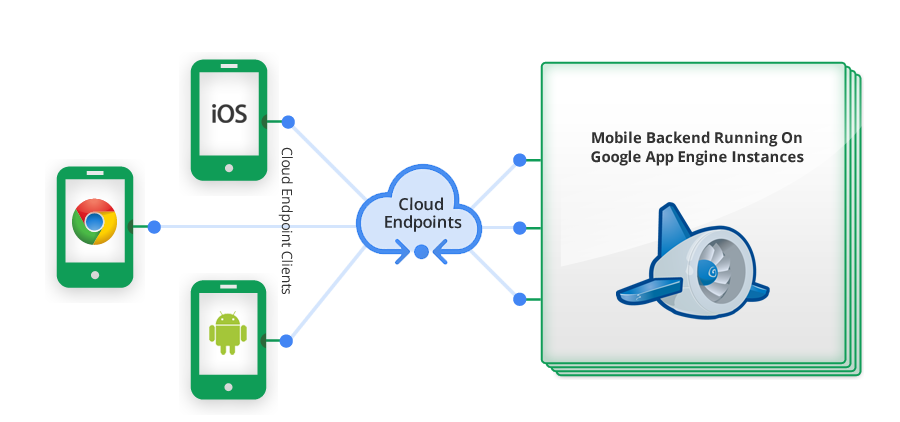

Agenda
- What is Discovery?
- Consuming Discovery-based APIs with
google-api-python-client - Creating Discovery based APIs
What is Discovery?
What is Discovery?
- An API:
- APIs directory of all APIs supported by the Discovery Service
- In depth machine-readable description of each API
- Self-describing
- A format:
- OAuth scopes
- Object and field schemas
- Resources and methods
- Request paths, parameters and payloads
- Inline documentation
- ...
Some Big Wins of Having Discovery
- Provides API design guidance
- Well-defined specification; common shared infrastructure
- Schemas, methods, auth; all pieces needed to construct a call
- Language neutral
Some Big Wins of Having Discovery
- Client Libraries Galore
- Python:
google-api-python-client - JavaScript:
google-api-javascript-client - Java:
google-api-java-client - Objective C:
google-api-objectivec-client - Ruby:
google-api-ruby-client - Go:
google-api-go-client - PHP:
google-api-php-client - Node.js:
google-api-nodejs-client - Dart:
google-api-dart-client - .NET:
google-api-dotnet-client - GWT:
gwt-google-apis - ...
- Python:
Discovery Specification: Scopes
Google OAuth2
API:
oauth2.userinfo.get
"auth": {
"oauth2": {
"scopes": {
"https://www.googleapis.com/auth/userinfo.email": {
"description": "View your email address"
},
...
"methods": {
"get": {
"scopes": [
"https://www.googleapis.com/auth/plus.me",
"https://www.googleapis.com/auth/userinfo.email",
"https://www.googleapis.com/auth/userinfo.profile"
]
}
Discovery Specification: Parameters
URL Shortener
API:
urlshortener.url.get
"parameters": {
"projection": {
"type": "string",
...
"enum": ["ANALYTICS_CLICKS", "ANALYTICS_TOP_STRINGS", "FULL"],
"enumDescriptions": [
...
],
},
"shortUrl": {
"type": "string",
...
"required": true,
}
}
Discovery Specification: Parameters
Drive
API:
drive.files.get
"parameters": {
"fileId": {
"type": "string",
"description": "The ID for the file in question.",
"required": true,
"location": "path"
},
"projection": {
...
"enum": ["BASIC", "FULL"],
}
...
}
Client Libraries
Consuming Discovery-based APIs with google-api-python-client
Service Objects
>>> from apiclient.discovery import build >>> service = build('urlshortener', 'v1') >>> result = service.url().get(shortUrl='http://goo.gl/cyY1U').execute() >>> result {u'id': u'http://goo.gl/cyY1U', u'kind': u'urlshortener#url', u'longUrl': u'https://pycon2013-discovery.appspot.com/', u'status': u'OK'}
Service Objects
apiclient/discovery.py
from apiclient.http import HttpRequest
DISCOVERY_URI = ('https://www.googleapis.com/discovery/v1/apis/'
'{api}/{apiVersion}/rest')
def build(serviceName,
version,
http=None,
discoveryServiceUrl=DISCOVERY_URI,
developerKey=None,
model=None,
requestBuilder=HttpRequest):
...
return build_from_document(content, base=discoveryServiceUrl, http=http,
developerKey=developerKey, model=model, requestBuilder=requestBuilder)
Service Objects
apiclient/discovery.py
def build_from_document(
service,
base=None,
http=None,
developerKey=None,
model=None,
requestBuilder=HttpRequest):
...
return Resource(http=http, baseUrl=base, model=model,
developerKey=developerKey, requestBuilder=requestBuilder,
resourceDesc=service, rootDesc=service, schema=schema)
Service Objects
apiclient/discovery.py
class Resource(object):
def __init__(self, http, baseUrl, model, requestBuilder, developerKey,
resourceDesc, rootDesc, schema):
...
self._set_service_methods()
def _set_dynamic_attr(self, attr_name, value):
self._dynamic_attrs.append(attr_name)
self.__dict__[attr_name] = value
def _set_service_methods(self):
self._add_basic_methods(self._resourceDesc, self._rootDesc, self._schema)
self._add_nested_resources(self._resourceDesc, self._rootDesc, self._schema)
self._add_next_methods(self._resourceDesc, self._schema)
Service Objects
apiclient/discovery.py
def _add_basic_methods(self, resourceDesc, rootDesc, schema):
...
for methodName, methodDesc in resourceDesc['methods'].iteritems():
fixedMethodName, method = createMethod(
methodName, methodDesc, rootDesc, schema)
self._set_dynamic_attr(fixedMethodName,
method.__get__(self, self.__class__))
...
Creating Discovery based APIs
Google Cloud Endpoints
What is Google App Engine?
Easy to build
Easy to scale
Easy to maintain

Google Cloud Endpoints

Building a Discovery API with Endpoints
Defining Schemas with protorpc
from protorpc import messages class Task(messages.Message): name = messages.StringField(1, required=True) owner = messages.StringField(2)
Building a Discovery API with Endpoints
Defining Schemas with protorpc
- Use
protorpcto talk to Google's API infrastructure - Strict field types help in generating backend API config
Building a Discovery API with Endpoints
Schema API Configuration
"Task": {
"id": "Task",
"properties": {
"name": {
"required": true,
"type": "string"
},
"owner": {
"type": "string"
}
},
"type": "object"
}
Building a Discovery API with Endpoints
Defining methods with protorpc
from google.appengine.ext import endpoints
from protorpc import remote
@endpoints.api(name='tasks', version='v1',
description='API for Task Management')
class TaskApi(remote.Service):
@endpoints.method(Task, Task,
name='task.insert', path='task')
def insert_task(self, request):
...
return request
Building a Discovery API with Endpoints
Defining methods with protorpc
- The
@endpoints.apidecorator provides API level metadata - The
@endpoints.methoddecorator helps determine method specific metadata
Building a Discovery API with Endpoints
Method API Configuration
"descriptor": {
"methods": {
"TaskApi.insert_task": {
"request": {
"$ref": "Task"
},
"response": {
"$ref": "Task"
}
},
...
Building a Discovery API with Endpoints
Method API Configuration
"tasks.task.insert": {
...
"httpMethod": "POST",
"path": "task",
"request": {
"body": "autoTemplate(backendRequest)",
"bodyName": "resource"
},
"response": {
"body": "autoTemplate(backendResponse)",
"bodyName": "resource"
},
"rosyMethod": "TaskApi.insert_task"
API Configuration vs. Discovery
- Many more fields in Discovery than required to describe service
- Backend Centric API Configuration
- Discovery is self-documenting, meant to be consumed by intelligent clients
Building a Discovery API with Endpoints
Contrast API Config and Discovery
...
@endpoints.method(Task, Task,
name='task.get', path='task/{name}',
http_method='GET')
def get_task(self, request):
...
return Task(...)
Building a Discovery API with Endpoints
Contrast API Config and Discovery
"tasks.task.get": {
...
"httpMethod": "GET",
"path": "task/{name}",
"request": {
"body": "empty",
"parameterOrder": ["name"],
"parameters": {
"name": {
"required": true,
"type": "string"
},
"owner": {
"type": "string"
...
Building a Discovery API with Endpoints
Contrast API Config and Discovery
"get": {
"id": "tasks.task.get",
"path": "task/{name}",
"httpMethod": "GET",
"parameters": {
"name": {
"type": "string",
"required": true,
"location": "path"
},
...
"response": {
"$ref": "Task"
}
Calling Our API
>>> from apiclient.discovery import build >>> DISCOVERY_URI = ('https://pycon2013-discovery.appspot.com/_ah/api/discovery/' ... 'v1/apis/{api}/{apiVersion}/rest') >>> service = build('tasks', 'v1', discoveryServiceUrl=DISCOVERY_URI) >>> body = {'name': 'Stop Talking', 'owner': 'Danny'} >>> result = service.task().insert(body=body).execute() >>> result {u'name': u'Stop Talking', u'owner': u'Danny'}
What's Next?
- Build your own API
- Check out a more advanced API
- Check out the Python Client Library
- Google Developers Live Endpoints Video
- APIs Explorer for this demo
- Slides for this talk
<Thank You!>
